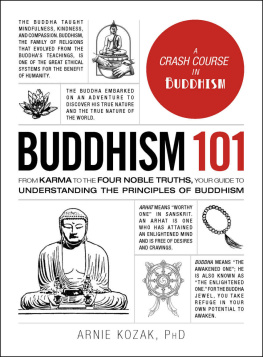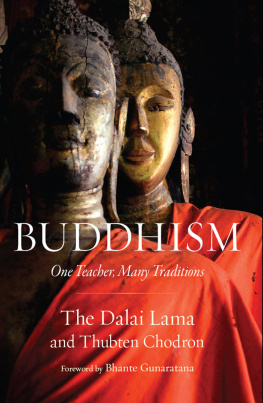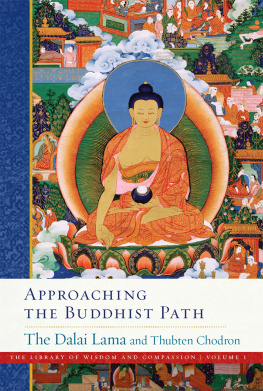F OREWORD

T HIS SMALL BOOK of teachings by His Holiness the Dalai Lama is a perfect introduction to traditional Buddhist thought and practice as understood and taught in the Tibetan tradition. Starting with the very foundation of Buddhism, the Four Noble Truths, His Holiness provides the framework and underpinnings necessary to understand the Buddhas basic teachings on working with suffering and dissatisfaction and cultivating happiness and peace, within which the entirety of Buddhism can be taught.
Following this presentation of the Four Noble Truths, His Holiness provides extremely useful and pragmatic commentaries on two of Buddhisms most popular and important short texts: The Eight Verses on Training the Mind and Atishas Lamp for the Path to Enlightenment. The language and presentation in these commentaries is clear and succinct, yet extremely accessible and practical, teaching us how to apply basic Buddhist principles in our lives.
The Eight Verses on Training the Mind is a classic text from the genre of Tibetan spiritual teachings called lojong or mind training. His Holiness often refers to this short work as one of his main sources of inspiration for the practice of compassion. Regarding these verses, the Dalai Lama has said, I recite these verses every day and, when I meet with difficult circumstances, reflect on their meaning. It helps me.
This practice of mind training consists of removing negative mental states and cultivating constructive ones. These negative states have as their basis excessive self-concern and a basic misunderstanding of the way things exist, such that we overvalue and undervalue the people and things with which we come into contact. We superimpose excessive goodness and badness upon our experiences, which then acts as a catalyst for the development of our afflictive emotions.
To overcome this excessive self-concern we need to develop heartfelt concern for others, love and compassion, the highest expression of which is the altruistic intention to become enlightened for the benefit of all beings, as well as a proper understanding of the nature of reality. We need to make this our real inner spiritual practice, and for this it always helps to contemplate and meditate upon the texts which teach about the good heart, altruism, and correct view. Such a text is The Eight Verses on Training the Mind written by the Kadampa Geshe Langri Thangpa.
Finally, the Dalai Lama provides a short, lucid commentary on Atishas Lamp for the Path to Enlightenment. This text, which became the source of a genre of teachings called lamrim (stages of the path), was written for the Tibetan people by the famed eleventh-century Indian Buddhist scholar and saint Atisha and is important because, although short, it sets forth an overview of the entire Buddhist path.
Thus, the Dalai Lama explains in this book the three most fundamental topics to be found in Buddhist spiritual teachingsthe Four Noble Truths, Mind Training, and Stages of the Pathin an accessible style aimed at Westerners interested in learning about authentic traditional Buddhist practice. The book also benefits from the wonderful translation by Geshe Thupten Jinpa. Therefore, this is an excellent introduction to traditional Tibetan Buddhist thought and practice.
Sidney Piburn
1. P RINCIPLES OF B UDDHISM
The Four Noble Truths

I SHALL PRESENT here a brief summary of the conceptual framework underpinning the Buddhas fundamental teaching on the Four Noble Truthsthe truth of suffering, the truth of its origin, the truth of its cessation, and the truth of the path leading to cessation.
The Buddha taught these noble truths soon after his attainment of enlightenment as part of what is known as the first turning of the Wheel of Dharma. Without a good understanding of the Four Noble Truths we cannot proceed meaningfully in our study and understanding of the nature of reality according to Buddhism. But first, I would like to make it clear that all major religious traditions have the same potential, the same message and goal, by which I mean the genuine wish to bring about better world conditions, a happier world with a more compassionate humanity. This is what all the major religions share.
In order to live harmoniously, we must make a common effort. It is very important to have mutual respect, rather than trying to propagate your own tradition. Therefore I always emphasize that people from different traditions should keep their own faith and not be in a hurry to change their religion. There are many Asian people in Australia today who come from traditionally Buddhist countries, and in this gathering here we have monks and nuns from Vietnam, Thailand, Burma, Sri Lanka, and Japan; in addition there are those from China, Mongolia, and Tibet. Also, there are some people among the millions of Westerners of traditionally Christian backgrounds who have an inclination or mental attitude which finds the Buddhist approach more effective. On that basis I am giving some explanation about the Dharma here today.
T HREE L EVELS OF U NDERSTANDING
In Buddhism, one speaks of three different levels of understanding, which are sequentialan understanding arrived at through learning and studying, an understanding developed as a result of deep reflection and contemplation, and an understanding acquired through meditative experience.
There is a definite order in the sequence of this three. So on the basis of study and learningwhich is the first levelwe deepen our understanding of a given topic by constantly reflecting upon it until we arrive at a point where we gain a high degree of certainty or conviction that is firmly grounded in reason. At this point, even if others were to contradict our understanding and the premises upon which it is based we would not be swayed, because our conviction in the truth has arisen through the power of our own critical reflection. This is the second level of understanding which, however, is still at the level of the intellect. If we pursue this understanding further and deepen it through constant contemplation and familiarity with the truth, we reach a point where we feel the impact at the emotional level. In other words, our conviction is no longer at the level of mere intellect. This is the third level of understanding, which is experiential, and this is referred to in the Buddhist texts as an understanding derived through meditative experience.

![Dalaï Lama XIV. An introduction to Buddhism: [teachings on the Four noble truths, The eight verses on training the mind and the Lamp for the path to enlightenment]](/uploads/posts/book/207935/thumbs/dala-lama-xiv-an-introduction-to-buddhism.jpg)










